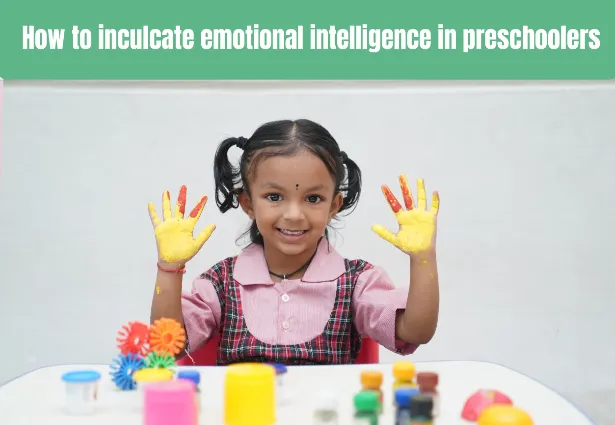Emotional intelligence is a valuable ability that involves recognising and regulating your own emotions, as well as those of others. Developing this skill in children is crucial as it can positively impact their future in both their personal and professional endeavours. It’s important to note that cultivating emotional intelligence is a gradual process that requires patience, effort, and time to fully embed in young minds.
Here are 5 ways to help develop emotional intelligence in preschoolers:
1. Listen to a child’s emotions
It is necessary for a parent to give their child a listening ear and acknowledge their emotions as it makes them overcome feelings of anger. Regardless of their age, children need a compassionate and attentive parent to express their feelings. Your kid’s behaviour can greatly improve once they have the opportunity to share their emotions with you. To open up and express themselves, children need to feel safe and secure knowing their parents are fully present and attentive. It’s crucial for parents to remain calm and attentive during these times, resisting the urge to make the emotions disappear. Your preschool kid has the ability to heal themselves, but it starts with being heard and understood.
2. Promote self-expression
Promoting self-expression in children is important for building emotional intelligence as it allows them to communicate their thoughts and feelings effectively. Children who are able to express themselves are better able to understand and manage their emotions, leading to improved mental health and well-being. Encouraging self-expression in preschoolers can be done through various activities such as drawing, painting, writing, storytelling, and drama. These activities allow them to express themselves creatively and provide a safe space to explore and empathise with themselves and others.
Providing children with opportunities to take part in group activities such as games or music can help them learn how to work collaboratively and communicate effectively with others. By promoting self-expression, children can learn how to identify and articulate their own needs and wants from a young age, which is an important step in developing self-awareness and self-regulation. This can develop kids into more resilient and better-equipped persons ready to handle challenges and setbacks.
3. Use positive reinforcement
Emotional intelligence can be greatly enhanced in children through the use of positive reinforcement. When kids receive recognition and rewards for their good behaviour, they feel acknowledged and valued. This, in turn, fosters self-worth and boosts their confidence. Regular use of positive reinforcement encourages children to repeat positive actions, leading to the gradual development of their emotional intelligence. It also helps them to regulate their emotions, giving them the ability to handle stressful circumstances and challenging situations with ease. Like whenever your child helps you or shows positive behaviour, reward them with a treat or genuine appreciation.
4. Teach empathy
The capacity to connect with and comprehend the emotions of others is what we call empathy. Nurturing this quality in children means encouraging them to imagine how they would feel if they were in someone else’s position. This leads to an understanding of the impact their actions have on others and fosters compassion, kindness, and a sense of belonging. Empathy is crucial for developing emotional intelligence, as it strengthens relationships, resolves conflict, and aids in making sound decisions. By instilling empathy in kids, we equip them with the tools to successfully navigate human emotions and relationships, paving the way for a more satisfying life experience.
5. Encourage mindfulness
Bringing awareness to the present moment is what mindfulness is all about. By teaching this valuable lesson to young ones, they can develop the ability to be mindful of their thoughts and emotions in real-time. This not only helps them to better comprehend their feelings but also prevents them from being swept away by them. Encourage children to dedicate a portion of their day to solely focusing on their breathing and observing their surroundings. This practice of mindfulness cultivates resilience and versatility in children. They learn to acknowledge their thoughts and emotions objectively, granting them the ability to embrace challenging situations and find effective ways to handle them.
Helping little kids understand and manage their feelings is like giving them a gift for their future happiness and success. We achieve this by actively listening to them, letting them express themselves, praising their good actions, teaching them to understand others’ feelings, and encouraging them to pay attention to the present moment.
As parents and teachers, these principles create a nurturing environment where children can learn to navigate their emotional landscape. These essential skills empower them to tackle life’s challenges, foster harmonious relationships, and leave a positive imprint on their journey. Let’s keep supporting emotional intelligence in your kids, making sure they grow up to be kind, aware, and strong individuals.


